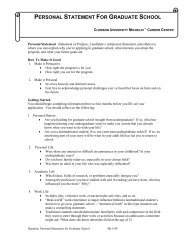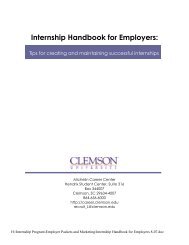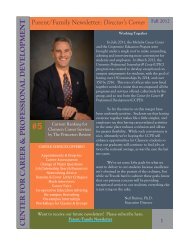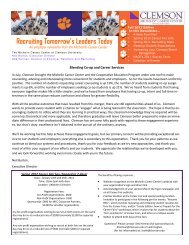Career Guide - Michelin Career Center - Clemson University
Career Guide - Michelin Career Center - Clemson University
Career Guide - Michelin Career Center - Clemson University
You also want an ePaper? Increase the reach of your titles
YUMPU automatically turns print PDFs into web optimized ePapers that Google loves.
<strong>Clemson</strong> <strong>University</strong><br />
<strong>Career</strong> <strong>Guide</strong> 2012 - 2013<br />
INTERVIEWING FOR STUDENTS WITH DISABILITIES<br />
Should you disclose your disability? If so, when? Timing your<br />
disclosure can be critical to whether or not you get a job offer.<br />
Disability Issues in the Employment Process:<br />
• Employers are not allowed to ask if you have a disability<br />
on the job application. They may, however, ask if you can<br />
perform the essential functions of the job.<br />
• Employers may not use tests that tend to screen out people<br />
with disabilities. The tests must be proven to be jobrelated<br />
and consistent with business necessity.<br />
• Employers must make sure that test administration is not<br />
discriminatory.<br />
• Drug tests and medical examinations must be job related<br />
are only allowed after a conditional job offer has been<br />
made.<br />
Suggestions for Preparing to Disclose:<br />
• Write out your disclosure statement and get feedback from<br />
friends in the working world and career counselors.<br />
• Rehearse your statement until you feel comfortable.<br />
• When writing out your script, avoid being too detailed and/<br />
or clinical sounding. The employer will want to know the<br />
basics: will you be there, can you do the job as well or<br />
better than other candidates, and will you be valuable to<br />
the company?<br />
• Remember your script and stay positive. If you remain<br />
positive, the employer will also. Focus on your skills rather<br />
than your disability.<br />
Disclosing During an Interview:<br />
Advantages: Honesty/peace of mind; Opportunity to<br />
respond briefly and positively, in person, to specific<br />
disability issues; Discrimination is less likely face-to-face.<br />
Disadvantages: Puts responsibility on you to handle<br />
disability issues in a clear, non-threatening way; Too much<br />
emphasis on the issue indicates a possible problem; You<br />
are not being evaluated on your abilities.<br />
Issues: How comfortable are you discussing your disability?<br />
Are you too preoccupied with your disability? These are<br />
very difficult questions, but ones that you can prepare to<br />
answer. Be prepared to re-direct or re-focus the interviewer<br />
if he/she gets off track with the interview.<br />
Tips for Preparing for an Interview:<br />
• Research the company and know the job description.<br />
This will help you inform the employer as to what, if any,<br />
accommodations you will need.<br />
• Become familiar with types of accommodations that are<br />
available and the cost of each one.<br />
46<br />
• Practice! Schedule one or more mock interviews with a<br />
career counselor so you can become more comfortable with<br />
the interviewing process. Mock interviews can also help<br />
you prepare for types of questions that you might be asked.<br />
• Ask questions of working friends with disabilities to find<br />
out how they prepared for interviews.<br />
Be prepared to answer questions such as:<br />
• Will my insurance rates go up?<br />
• How would you be able to get out of the building in case of an<br />
emergency, such as a fire?<br />
• How will you get to work?<br />
• This position deals with highly sensitive information. If<br />
you are hired, your reader or interpreter will have access to<br />
confidential material.<br />
• I know you’ve said you can do the job, but in light of your<br />
disability, I am having a hard time understanding how you<br />
would do it. Would you mind showing me?<br />
• I do not know anything about making accommodations for a<br />
disability such as yours. I would not know where to start.<br />
During an Interview:<br />
• Put the employer at ease by addressing any noticeable<br />
disabilities.<br />
• Remain engaged in a discussion with the interviewer,<br />
rather than just answer questions. Be prepared to re-focus<br />
the employer if they get off-topic or sidetracked.<br />
• Inform the employer of any accommodations that you<br />
would need and how they can be accessed.<br />
• Focus on the positive! Remember to sell your strengths!<br />
Illegal Questions:<br />
The Americans with Disabilities Act makes it illegal for<br />
employers to ask the following questions:<br />
• Have you ever been treated for any diseases?<br />
• Has anyone in your family ever had any of the following<br />
listed illnesses?<br />
• Have you ever been hospitalized? For what?<br />
• Have you ever been treated for a mental disorder?<br />
• Are you taking any medication?<br />
• Have you ever been treated for drug addiction or<br />
alcoholism?<br />
• Do you have any major physical disabilities? If so, how<br />
did your disability come about?<br />
• Have you ever filed for worker’s compensation benefits?<br />
• How many times were you absent from your previous job<br />
because of illness?<br />
• Do you have any disabilities that would affect your<br />
performance in the position for which you are applying?








